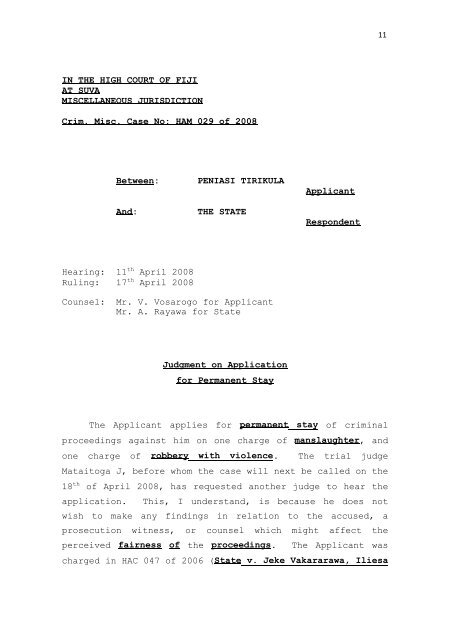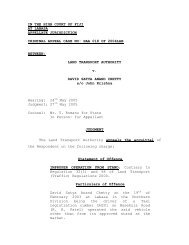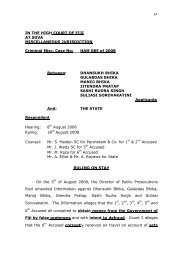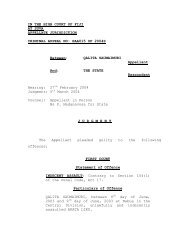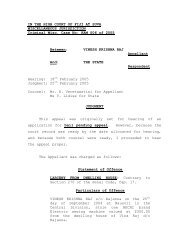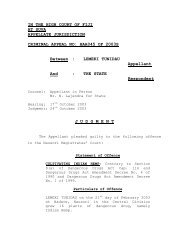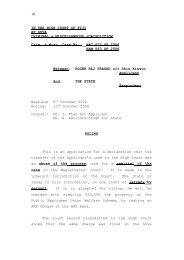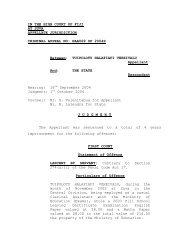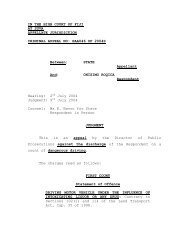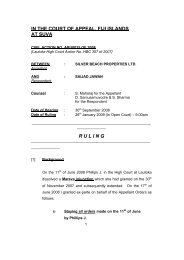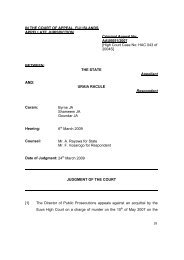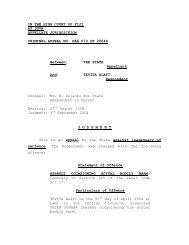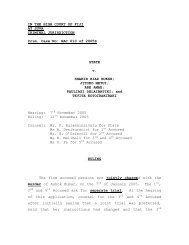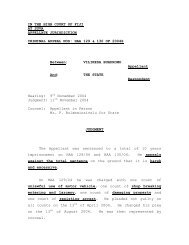Peniasi Tirikula v State HAM029J.08S - Law Fiji
Peniasi Tirikula v State HAM029J.08S - Law Fiji
Peniasi Tirikula v State HAM029J.08S - Law Fiji
You also want an ePaper? Increase the reach of your titles
YUMPU automatically turns print PDFs into web optimized ePapers that Google loves.
11IN THE HIGH COURT OF FIJIAT SUVAMISCELLANEOUS JURISDICTIONCrim. Misc. Case No: HAM 029 of 2008Between:And:PENIASI TIRIKULATHE STATEApplicantRespondentHearing: 11 th April 2008Ruling: 17 th April 2008Counsel:Mr. V. Vosarogo for ApplicantMr. A. Rayawa for <strong>State</strong>Judgment on Applicationfor Permanent StayThe Applicant applies for permanent stay of criminalproceedings against him on one charge of manslaughter, andone charge of robbery with violence. The trial judgeMataitoga J, before whom the case will next be called on the18 th of April 2008, has requested another judge to hear theapplication. This, I understand, is because he does notwish to make any findings in relation to the accused, aprosecution witness, or counsel which might affect theperceived fairness of the proceedings. The Applicant wascharged in HAC 047 of 2006 (<strong>State</strong> v. Jeke Vakararawa, Iliesa
11Vakaloloma and Petaia Vuli) with robbery with violence but Irefused an application for consolidation in that case andordered that the Applicant be separately tried. I alsofound that there appeared to be no evidence against theApplicant (other than the confessions of his co-accusedwhich were not admissible as evidence against him) and askedthe <strong>State</strong> why I should not quash the Information. The <strong>State</strong>then pointed to the proposed evidence of the Applicant’spartner which linked him to stolen goods. I did not quashthe Information but maintained my order for separate trial.The separate trial for the Applicant is now listedbefore Mataitoga J. He is now represented by Mr. Vosarogo,the Director of the Legal Aid Commission, who makes thisapplication for stay. The application is for the followingorders:1. An order to stay proceedings against theapplicant on the ground of abuse of processbased on prosecutorial misconduct; and2. An order staying proceedings against theapplicant on the ground that proceedingswould amount to an unfair trial.The application is supported by the affidavits of theApplicant and Jyotishna Nair, counsel at the Legal AidCommission. The facts set out in these affidavits are thatthe Applicant, Iliesa Vakaloloma, Jeke Vakararawa and PetaiaVuli were jointly charged with manslaughter and robbery withviolence in relation to events on the 24 th of April 2006.The facts of the case are irrelevant to this application,but are set out in my judgment refusing consolidation on the9 th of February 2007. At that time all accused persons wererepresented by Ms Vaniqi of the Legal Aid Commission. MsMadanavosa appeared for the prosecution.
11The trial was listed for hearing against the accused in47/2006 on the 2 nd of July 2007. When the case was calledon the 25 th of May 2007, Ms Vaniqi appeared as dutysolicitor and said that Legal Aid would be representing the2 nd Accused, Iliesa Vakaloloma. However on the 15 th of June2007, there was a shift in this position. Ms Jyotishna Nairsaid that she was not sure if she would be representingVakaloloma as he had yet to submit his application form. Onthe 27 th of June, his application for legal aid was “stillbeing assessed.” On the 2 nd of July the trial could notproceed because Vakaloloma’s application was being assessed.On the 27 th of July that position remained unchanged. Onthe 27 th of August 2007, only the 1 st and 3 rd accused wererepresented by legal aid. The position remained unchangeduntil the 19 th of October 2007. On that date, for the firsttime, the 2 nd Accused was represented by Ms Senikuraciri. Anew trial date was set for the 5 th of May 2008.The trial date for the Applicant was set by MataitogaJ, for the 13 th of March 2008. On the 4 th of April 2008 theDirector of Public Prosecutions entered a nolle prosequi inrelation to Iliesa Vakaloloma. The Applicant in hisaffidavit says that he was not aware that Vakaloloma hadbeen given immunity from prosecution, and that he had giventhe <strong>State</strong> a witness statement dated the 26 th of February2008, incriminating the Applicant.The affidavit of Jyotishna Nair states that Ms Nair wascounsel on the record for Vakaloloma, Vakararawa and Vuli inCase 47/2006 and that legal aid was granted to Vakaloloma onthe 10 th of October 2007. She states that the taking of thewitness statement in February 2008, and the granting to him
11of immunity was done without consultation with her. Shesays that in the absence “of any explanation to theCommission is invitation to any right thinking person thatthe <strong>State</strong> has conducted itself with ulterior notice toensure conviction at all costs.” She then lists the mattersof concern to her, as counsel for Vakaloloma, Vakararawa andVuli. They are:“a.I was not informed of the immunityarrangement with my client Mr. IliesaVakaloloma; andb. I have not been shown any immunity offerletter nor any evidence of acceptance;andc. It is not known to me if my clientIliesa Vakaloloma will be used totestify against his two co-accused inCriminal Action 47 of 2006; andd. That the answer to (c) above isimportant because it would unfortunatelymean that I will have to withdraw ascounsel for the remaining accused as Iwill now be placed in a conflict tocross-examine Iliesa Vakaloloma; ande. That the situation referred to in (d)above is wholly manufacture of the <strong>State</strong>and not contributed to or acquiesced toby counsel; andf. Prejudice is now the only likely outcomefrom the unfair use of its powers by the<strong>State</strong>.”In summary, counsel for the Applicant submits that theDPP exercised his powers to grant immunity to Vakalolomaimproperly, unfairly and in circumstances which amount toan abuse of the process.
11The <strong>State</strong> filed the affidavit of Pauline Madanavosa inresponse. She states that she was the former case officerfor the case and she annexes to her affidavit the immunityletter written to Vakaloloma. It is dated the 5 th ofFebruary 2008, and reads as follows:“On the basis of your signed statement to thepolice dated 26 th February, 2008, which youhave acknowledged as true and correct, and inthe interests of justice. I am prepared togrant you immunity from prosecution inrespect of the offence of Robbery withViolence contrary to section 293(1)(b) of thePenal Code (Cap 17) and Manslaughter contraryto section 198 and 201 of the Penal Code (Cap17) with which the above-named PENIASITIRIKULA and others are charged. The offerof immunity is made on the basis that you,ILIESA VAKALOLOMA if called by the <strong>State</strong> as awitness in the trial of PENIASI TIRIKULA andothers will give truthful evidence inaccordance with the aforementionedstatement.”She concedes that the immunity was granted withoutconsultation with the Legal Aid Commission.However, shealso states that the Applicant was unrepresented during thestart of the trial in HAC 105 of 2006 and there was noprejudice to him. Further she says that the Commission isonly representing the Applicant for legal submissions inrelation to the admissibility of the evidence of twoprosecution witnesses (I am told by counsel from the Bartable that the issues for argument were the res gestae ruleand the law of dying declarations) and not for the trialproper.She further says that Ms Nair will not be inconflict in Case No. 47/2006 because she is not counsel forVakaloloma. It is Ms Senikuraciri who is his counsel. Sheconcedes only one impropriety on the part of the <strong>State</strong>, andthat is the failure to consult the Legal Aid Commission on
11the granting of immunity. She states however that Mr.Rayawa wrote to the Commission on the 25 th of March 2008apologising for this omission. Finally she states thatthere was no prejudice to the Applicant or to Vakaloloma(who is immune from prosecution) and that no malice had beenintended.Abuse of the ProcessThe High Court has inherent powers to stay criminalproceedings to prevent an abuse of the process. In DPP v.Humphreys (1977) AC 1, the House of Lords considered thejurisdiction in relation to a criminal prosecution forperjury. The respondent in that case had been acquitted ofdriving a motor vehicle whilst disqualified. The only issuehad been whether the respondent had been correctlyidentified as the driver. The respondent’s evidence wasthat he had not driven any motor vehicle during 1972. Hewas then charged with perjury. The same witness gaveevidence that he had seen the respondent driving the samevehicle. His evidence was accepted, and the respondent wasconvicted. The defence appealed arguing issue estoppel.The Court of Appeal allowed the appeal. On appeal the Houseof Lords held that the conviction for perjury should berestored. The court considered the jurisdiction and scopeof the inherent power to stay a prosecution for abuse of theprocess.Lord Salmon said at page 46C:“… a judge has not and should not have anyresponsibility for the institution ofprosecutions; nor has he any power to refuseto allow a prosecution to proceed merelybecause he considers that, as a matter ofpolicy, it ought not to have been brought.
11It is only if the prosecution amounts to anabuse of the process of the court and isoppressive and vexatious that the judge hasthe power to intervene. Fortunately, suchprosecutions are hardly ever brought but thepower of the court to prevent them is in myview, of great constitutional importance andshould be jealously preserved.”In R v. Horseferry Road Magistrates’ Court ex parteBennet (1994) 1 AC 42, the prosecution of the accused afterthe law enforcement agencies of South Africa and England hadconspired to sidestep extradition procedures and deportedhim, was stayed for abuse of the process.The House ofLords held that prosecutions could be stayed to ensure therule of law was maintained, to prevent a misuse of the courtprocess and where the prosecution has acted in bad faith.These authorities were recently reviewed in The <strong>State</strong>v. Sat Narayan Pal Crim. Appeal AAU0036/2006 in the <strong>Fiji</strong>Court of Appeal. In that case, the prosecution forcorruption of an inspector of the Department of Fair Tradingwas stayed for abuse of the process. The abuse in that casewas that the Inspector was videotaped at the instigation ofa suspect in a fair trading investigation. The suspectinstigated the recording by discussing the matter with ajournalist at <strong>Fiji</strong> Television. The result of the videorecording was that the suspect was never prosecuted, therewas media coverage on the corrupt conversation between theinspector and the suspect, and the inspector was chargedwith corruption. The trial judge (Gates J) said this in thecourse of his judgment:“In considering the overall circumstances inwhich the conversation was approached andrecorded, I find that there has been a lackof bona fides amounting to an abuse of theprocess. Had there been good faith, an
11absence of conflict of interest, and nomanipulation of the process, I might havefound otherwise for the fruit of therecording may well have established guilt.But the court cannot stand by and lendcredence to such unjust maneuvers whichundermine the credibility of the judicialsystem: Reg v. Horseferry Rd Justices Exparte Bennet [1994] 1 AC 42; R v. Shaheed[2002] 2 NZLR 377.”The Court of Appeal approved this decision.paragraph 70 of its judgment it said:At“It is our view that what occurred here – asappears from the facts as set out in HisLordship’s Ruling – was so lamentable as toraise the highest level of concern aboutreliance upon such conduct as a properfoundation for the administration of justice.Indeed, we agree that it was so lamentableas to bring the conduct well within theinherent jurisdiction of the court. It was aclear abuse of process.”Counsel for the Applicant has referred me to a numberof useful cases, for which I am grateful. A perusal of themshows that the DPP’s powers for instance to enter a nolleprosequi in a private prosecution, are susceptible tojudicial review where there is evidence of an excess ofjurisdiction, or of bad faith or dishonesty (Jeewan Mohit v.DPP of Mauritius Privy Council [2006] UK PC 20 but that inconformity with the doctrine of the separation of powers,any such review should be exercised sparingly. The SupremeCourt of Canada in Glorian Keyowski v. The Queen [1988] 1SCR 657, considered whether a second retrial after twojuries had failed to reach a verdict on a charge of criminalnegligence causing death, was an abuse of the process. TheSupreme Court held it was not, saying that the power to stay
11a trial where a prosecution was oppressive or vexatiousshould only be exercised in the clearest of cases.Prosecutorial misconduct might be a factor to be taken intoaccount when considering whether the jurisdiction should beexercised, but it is not the deciding factor.At paragraph 2 of the Court’s judgment (per Wilson J),is the following summary of the law on prosecutorial abuse:“The availability of a stay of proceedings toremedy an abuse of process was confirmed bythis Court in R v. Jewitt [1985] 2 SCR 128.On that occasion the Court stated that thetest for abuse of process was that initiallyformulated by the Ontario Court of Appeal inR v. Young 40 CR (3d) 289. A stay should begranted where “compelling an accused to standtrial would violate those fundamentalprinciples of justice which underlie thecommunity’s sense of fair play and decency”or where the proceedings are “oppressive orvexatious” ([1985] 2 SCR at pp 136-37). TheCourt in Jewitt also adopted “the caveatadded by the Court in Young that this is apower which can be exercised only in the“clearest of cases” (p.137).”I respectfully adopt these principles. I believe themto represent the law in <strong>Fiji</strong> and other common lawjurisdictions. The questions for me are therefore:1. Has the prosecution manipulated or abusedthe process in offering immunity toVakaloloma?2. Has there been prosecutorial misconduct inthat there is evidence of malice or badfaith?3. As a result of the grant of immunity aboutwhich counsel had no knowledge, are the
11proceedings against the Applicantoppressive and vexatious?4. Is this a clear case in which a stay isjustified?There is no doubt at all that on the 9 th of February2007, the evidence against the Applicant, as disclosed tothe defence was nebulous. The Information was not quashedbut there was evidence of a tenuous link between theApplicant and the stolen goods which might not have surviveda no case to answer submission. It is also clear, that the<strong>State</strong> (forewarned of this difficulty by my ruling of 9 th ofFebruary) set out to strengthen its case. Although ideally,investigations should be complete before the accused ischarged, there is nothing improper about continuinginvestigations after charge. Certainly the <strong>State</strong> is notestopped (subject to its obligations to disclose) fromleading new evidence obtained even during the trial. Up tothis point, there can be no complaint about the prosecutor’sconduct.What happened next however, was unusual. At some timebetween the 19 th of October 2007 (when Case No. 47/2006 wascalled in the High Court) and the 5 th of February 2008, the<strong>State</strong> made overtures to Vakaloloma to become a <strong>State</strong>witness. Until the 19 th of October, Vakaloloma’srepresentation was not confirmed. Earlier, Ms Nair, and MsVaniqi had only appeared as “duty solicitor.” On the 19 thof October however Ms Senikuraciri appeared for the 2 ndAccused in Case No. 47/2006. I assume that he had separaterepresentation because there was a conflict of interestbetween his defence, and that of the 1 st and 3 rd Accused.According to the normal conventions of the Bar, the
11prosecution and the police should not have approachedVakaloloma at all without the consent of his solicitor. Theovertures were quite irregular and the DPP must acceptresponsibility for such an impropriety. From the point ofview of Vakaloloma, he might have been severely prejudicedby the overtures and might have made damaging admissionswhich were prejudicial to his case.However the question for me to consider is notmisconduct towards Vakaloloma and his lawyer, but towardsthe Applicant. Of course, if Vakaloloma gives evidenceimplicating the Applicant, the effect of the grant ofimmunity to him affects the Applicant directly. Theevidence against him is potentially stronger. However, thatin itself is not oppressive or vexatious. Nor is he placedin a position of particular disadvantage because, onceseparate trial was ordered, there was always a possibilitythat one or other of his former co-accused, would giveevidence at his trial. The grant of immunity has notchanged that position.Furthermore, the Applicant himself is not representedby counsel, other than for this application and for legalsubmissions on rules of evidence during the trial.Vakaloloma’s solicitor was never his solicitor. Mr.Vosarogo, who is now representing him for this application,was not Vakaloloma’s solicitor. Nor was Ms Nair, althoughshe refers to herself as Vakaloloma’s counsel. According tothe court record, she only appeared as duty solicitor, andon several occasions said that she was not representingVakaloloma because legal aid was still being assessed.Finally, when it was assessed, he was represented not by MsNair, but by Ms Senikuraciri. This was quite proper becauseit is apparent that separate representation was justified in
11the circumstances. As such, I see no prejudice to theApplicant as a result of the granting of the immunity, andas a result of the prosecutor’s failure to informVakaloloma’s counsel of the intention to make him a <strong>State</strong>witness.Nor do I accept that Mr. Rayawa or Ms Madanavosa weremotivated by spite or malice towards the Applicant. Thecircumstances suggest an inadvertence, and bad management ofthe case by the DPP’s Office. I do not accept that theprosecutors acted in bad faith. A determination, even azeal to strengthen the prosecution case is not evidence ofbad faith. However, this is an appropriate case to remind<strong>State</strong> counsel that no matter how serious a charge and howimportant a prosecution, their duty is to maintain highprofessional standards at all times, and a sense offairness.I accept therefore that there was no bad faith. I alsoaccept that the <strong>State</strong> was not manipulating the courtprocess, nor abusing it. It follows that this is not a caseof the abuse of the process and there is no justificationfor exercising the inherent powers of the court to stay thisprosecution.The application is dismissed. The trial must proceed.Nazhat Shameem
11JUDGEAt Suva17 th April 2008


